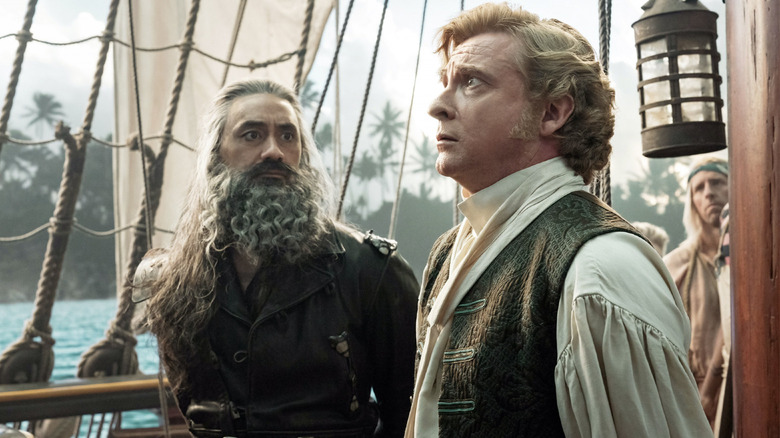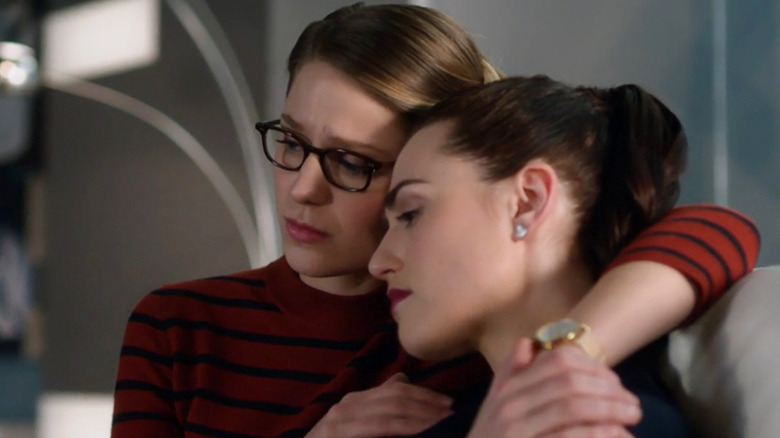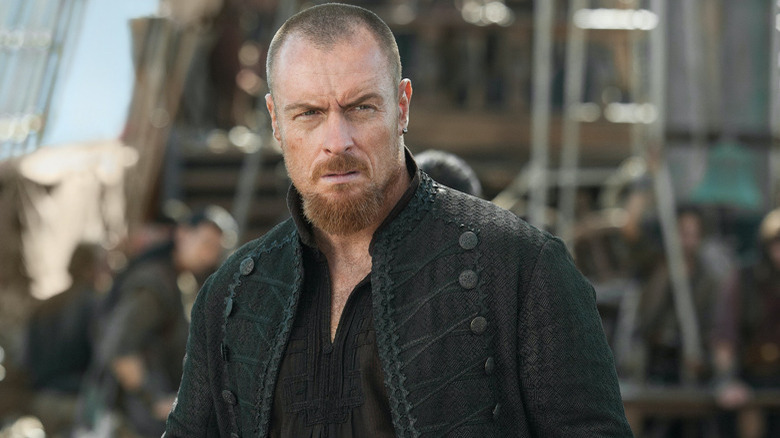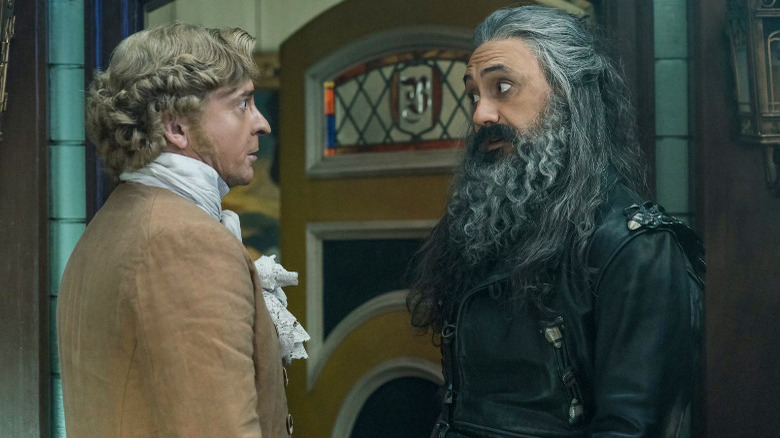
When I wrote about "Our Flag Means Death" for /Film's Daily Stream series, I mentioned that the then-evolving dynamic between leads Stede "Gentleman Pirate" Bonnet (Rhys Darby) and Edward "Blackbeard" Teach (Taika Waititi) probably wouldn't prove to be non-platonic, "but one can dream!" It's not that a Stede-Ed romance didn't make sense. Whatever the nature of the real Bonnet and Blackbeard's association (which is a bit of a mystery), David Jenkins' pirate comedy series presented the unlikely duo as being flip sides of the same coin in its first six episodes. Each of them was clearly attracted to the other's quirks and lifestyle ... but would the show actually go so far as to make their relationship explicitly queer?
The answer, as it turns out, was an unexpected but welcome "yes," with Stede and Ed even locking lips in the penultimate episode of season 1. Complications soon arose, of course, as "Our Flag Means Death" set the stage for its not-yet-confirmed second season with its emotional roller coaster ride of a season 1 finale. (The ball's in your court now, HBO Max!) Whatever happens from here, though, Stede and Ed's romantic feelings for one another are canon to the series, and all it took was a single season of 10 half-hour episodes.
So how did we get to this refreshing place where a show can have its male leads fall in love and it doesn't even feel like a big deal? To answer that question, let's start by taking a look back at the messy history of queer-baiting — i.e. implying queer relationships or attraction between characters to appeal to LGBTQ+ viewers (or just to draw attention) without actually depicting them — and queer subtext in media.
Just Guys Being Dudes And Gals Being Pals

It's no secret that the popularity of many shows -- "Sherlock," "Supernatural," "Hannibal," and "Rizzoli & Isles" being a few oft-referenced examples -- was driven greatly by fandoms who shipped queer couples. Similarly, the practice of fans backing LGBTQ+ couples in film and TV series predates the age of social media. Rest assured, dear readers, the younger me never stopped hoping for Cory Matthews (Ben Savage) and Shawn Hunter (Rider Strong) to get together for real on "Boy Meets World," no matter how much the beloved 1990s sitcom played the idea for laughs.
Yet, as that very example illustrates, time and time again, these shows would either queer-bait or subtext the hell out of these pairings without making them official. Even the erotically-charged "Hannibal" resisted going so far as to have Hannibal Lecter and Will Graham kiss in its season 3 finale (though stars Mads Mikkelsen and Hugh Dancy did so in some unused takes anyway). In many of these cases, they would make supporting characters canonically queer, but rarely the leads. Perhaps most notoriously, the CW series "Supergirl" featured several LGBTQ+ heroes yet danced around ever exploring a romance between the titular Kryptonian, Kara Danvers (Melissa Benoist), and her pal Lena Luthor (Katie McGrath), a ship commonly known as "Supercorp."
None of this is to say that artists should always give their fans what they want. Plus, we know for a fact that even when shows have included LGBTQ+ romances, it's usually come with network-imposed limits. (Nickelodeon can toot its horn about being queer-friendly all it wants, but I haven't forgotten how it handled "The Legend of Korra.") There are also great exceptions to this trend, like The CW's "Legends of Tomorrow." But at the same time, it's telling how often these series would explore hetero romances almost on a whim (I still have no idea why Lena dated Mehcad Brooks' Jimmy Olsen on "Supergirl"), only for their creatives to imply a fan-shipped queer couple just didn't make sense, despite all evidence to the contrary.
All Pirates Are Queer, I Don't Make The Rules

Part of what makes "Our Flag Means Death" such a delight its that it's a queer show down to its DNA. Besides Stede and Ed, there's also a romance between Stede's scribe Lucius (Nathan Foad) and his crew-mate Black Pete (Matthew Maher), as well as an explicitly non-binary character in the form of the deadly fighter Jim (played by non-binary actor Vico Ortiz). Other pirates aboard Stede's ship, the Revenge — like Frenchie (Joel Fry) and Wee John Feeney (Kristian Nairn) — are equally intimate with one another in many ways, even if they haven't hooked up properly just yet.
Of course, "Our Flag Means Death" isn't the first major cable TV show to feature LGBTQ+ pirates. "Black Sails," the quasi-prequel series to "Treasure Island" that aired on Starz from 2014-2017, included several queer characters, not least of whom was the show's lead, the infamous Captain James Flint (Toby Stephens). As revealed in flashbacks in season 2, Flint was once James McGraw, a Royal Navy lieutenant whose romantic affair with one Lord Thomas Hamilton (Rupert Penry-Jones) was ultimately exposed, forcing him to flee England and assume a new identity. Hamilton was then committed to the Bethlem Royal Hospital, a mental asylum, as a cruel form of punishment.
Don't get me wrong; depressing queer stories like this have their place, but we're not exactly hurting for them, either. This "Black Sails" subplot was also pretty far removed from the show's main action, with Hamilton being someone that viewers hadn't met prior (and, thus, had no deeper connection to). By comparison, Stede and Ed are the protagonists on "Our Flag Means Death," and even some of the series' villains simply assume that all pirates are "buggering" each other (as one of them puts it) and only care when it conflicts with their own selfish interests. Indeed, one of the show's tenets is that piracy was a means to greater freedom for those marginalized or oppressed by society, be it due to their race, gender, or sexuality, if not all three.
Bad Representation Is Still Representation

How, then, did we get to this place where "Our Flag Means Death" can show Stede and Ed happily kissing one another while watching a sunset, or the "Hannibal" descendant "Killing Eve" can have Eve Polastri (Sandra Oh) and Villanelle (Jodie Comer) locking lips in the middle of trying to kill each other? It doesn't excuse all those years of queer-baiting and subtext-only LGBTQ+ romances on the shows that have come before them. But at the same time, bad representation is still representation, and those TV series may have well helped to normalize flirty banter between characters of the same gender in their own problematic way.
Hard truth is, real change only comes from people calling on the minds behind their favorites shows to do better when it comes to LGBTQ+ topics and other types of representation (race, disabilities, gender, you name it), again and again. It can be exhausting, and it's vital for allies of the queer community to do their part to help, but the only way to be truly progressive is to, well, actively push for progress. This is also why it's such a relief when a funny, off-beat series like "Our Flag Means Death" comes along without the burden of expectations and says, "Here, have some queer pirates!" simply because it can.
"Our Flag Means Death" season 1 is now streaming in full on HBO Max.
Read this next: The Best Movies Streaming Right Now: Malignant, A Hero, And More
The post Our Flag Means Death is the Anti-Queerbaiting Series You've Been Waiting For appeared first on /Film.
0 Comments